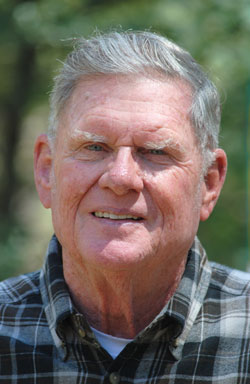Idyllwild Water District residents will have a choice of five candidates for the three director seats up for election in the August mail-in ballot election. Running for re-election are President Jim Billman and Warren Monroe and Dean Lattin, who is in his first election. The two challengers are Steven Kunkle and June Rockwell.
Ballots must be received by election officials no later than the close of the polls on election day or be postmarked on or before election day, Aug. 25, and received no later than three days after election day to be counted.
Before August, the Town Crier will interview each candidate. On Wednesday, Aug. 5, the Town Crier will hold a candidates forum for IWD voters. The forum will be from 6 to 8 p.m. at the Idyllwild Nature Center.
This candidate interview is with Lattin. Interviews with Billman and Monroe will appear in the July 30 issue of the Town Crier. The interview with Rockwell was published in the July 16 issue of the paper and the Kunkle interview is on page 7 of this issue.

Photo by J.P. Crumrine
Dean Lattin is a native Californian, born in San Francisco almost 75 years ago. A pilot — a missionary pilot — who still flies to produce aerial maps, he and his wife came to Idyllwild in 2005. But they had been here often before, visiting their daughter and her family many times.
“We fell in love with it in 1999 and wanted to be with our granddaughters,” he said.
Lattin has been an Idyllwild Water District director since July 24, 2013, when he was appointed to fill the remaining term of Allan Morphett, who had died.
TC: Why did you originally join the board. Why do you want to continue?
“My first priority is responsiveness to the public,” Lattin stated. “So often, government agencies focus on sustaining the agency rather than service.”
TC: With respect to revenues and water supply, what should customers expect in the next 12 months? … and the next five years?
Water supply will depend on weather conditions, according to Lattin. The monsoonal forecasts for the remainder of the summer and the possible El Niño pattern this winter will be beneficial.
“But we’re looking at three to four years of percolation for these aquifers,” he said. “But Idyllwild’s advantage is being small; therefore consumption is not great.”
Although groundwater levels for the district’s wells have dropped during the drought, Lattin pointed out that the levels have been stable in the past six months. Also, the addition of the rehabilitated horizontal wells (above Foster Lake) has added 10 percent to the water supply.
With respect to revenue needs, Lattin said, the board and manager are looking at projects to increase efficiencies throughout the district. “Cutting personnel from 12 to nine might be a little drastic because it only leaves three field workers to handle field emergencies,” he noted. [These vacancies have been filled. New staff members have started or will start in early August, according to General Manager Tom Lynch.]
TC: How do you assess the district’s infrastructure?
“It’s aging and something has to be done,” Lattin replied. A long-term maintenance program, including pipeline replacement, is being developed, according to Lattin. “We have quite a bit [of pipe] and will do it incrementally.”
The solar array near Foster Lake has been repaired and Lattin feels its electric production helps the district reduce pumping costs, which have increased as well levels have fallen.
TC: Besides simply urging “conservation,” what else can the district do to prepare for Stage 3?
Lattin said the future recycling facility, which will produce water for landscape irrigation, will reduce the demand for the district’s potable water. He expects Idyllwild Arts to consume a significant portion of this water and eventually the recycling facility will be sufficiently self-supporting to re-pay the loan without water or sewer district funds.
Lattin was very optimistic about using the recycled water. He envisions that in the future, the district can pump it closer to Foster Lake and even serve downtown customers for landscaping.
Basically, Lattin felt the public was already contributing to water conservation. “Private consumption is already saving more than 30 percent voluntarily,” he added.
TC: What is your view on “will serve” letters during stages 2 and 3? Should new development be curtailed?
“If we return to normal rainfall, we’ll have the latitude to grant ‘will-serve’ letters,” he replied. “But in the current drought and well levels, we need to maintain the current policy. I don’t foresee any this year.”
Conclusion
“I want to ensure quality water at a reasonable rate,” Lattin stated.










